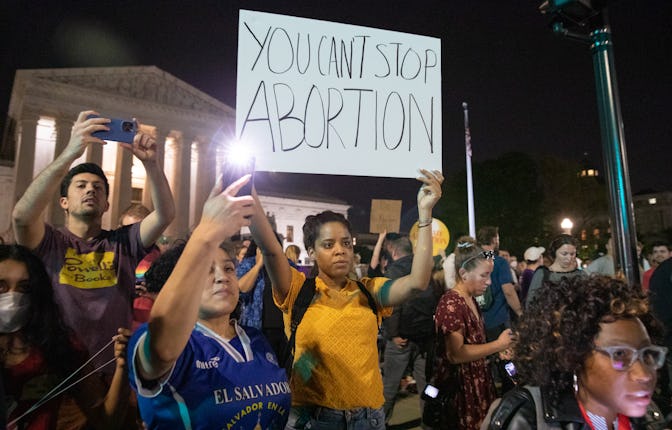In 24 hours, the world of reproductive rights was turned upside down
Abortion access is on the line. This is how we got here.

On Monday evening, Politico published what it claimed was a leaked Supreme Court draft ruling showing that a majority of the right-leaning court is prepared to overturn 1973’s landmark Roe v. Wade decision, thereby nullifying the constitutional right to abortion on the federal level.
The draft ruling for Dobbs v. Jackson Woman’s Health Organization was initially circulated amongst the court in February, the document shows, and stands in its current form as an undiluted assault on federal access to abortions. The opinion is written by arch-conservative Justice Samuel Alito, who declares at one point that “Roe was egregiously wrong from the start.” In no uncertain terms, then, the draft appears to be proof positive that when the court makes its official ruling (expected sometime next month), it will abolish federal reproductive health rights in this country, and dramatically warp the very fabric of American society to a horrifying degree as a result.
Before the pearl-clutching punditry over What This Means for Democrats and A Supreme Court Leak Threatens the Precious Norms of Our Judicial Institutions overwhelms the discourse, let’s be perfectly clear: The court’s pending ruling is first and foremost a cataclysm for millions of people who will suddenly have their bodily autonomy ripped out from under them in the service of a decades-long conservative agenda of repressive Christian theocracy. Conservatives have shouted this goal from the rooftops — and on the campaign trails — for years, even as the overwhelming majority of the country disagrees.
Still, there’s a yawning gap between “knowing this is coming” and “it’s actually here.” The printed and published reality of the court’s impending decision renders the expected, but still-theoretical abolition of Roe in stark, horrifying relief — particularly given Alito’s explicit citation of other landmark civil rights rulings that legalized same-sex marriage and sodomy in his draft, raising the question of whether the conservative court would attack same-sex intimacy next.
Responses to the draft ruling have ranged from shock and horror to fury and calls to action — both in terms of pressuring lawmakers to codify reproductive health access into law, and to prepare for a post-Roe future. More than a dozen states already have laws on the books set to trigger full abortion bans the moment Roe is struck down. Democratic lawmakers — members of a party in control of both chambers of Congress, and the White House — spent much of the morning after Politico’s report wringing their hands and issuing vague promises of future accountability for the very Republicans who deftly outmaneuvered them in the first place.
Conservatives, meanwhile, have chosen to focus on the fact that the draft ruling was leaked in the first place — an unforgivable assault, they claim, on the sanctity of the Supreme Court which they, themselves, have worked so hard to skew in their favor for this very purpose.
Of course, a few choice names on the right tried to claim they simply had no idea this was very obviously coming:
The draft ruling also prompted near-instantaneous protests outside the Supreme Court building itself, with activists furious at the impending repeal of Roe. “It is 12:30 in the morning, and unfortunately, we have to be at the Supreme Court because our government isn’t supporting and uplifting women and we have to use the time that we should be spending studying to be here,” American University student Jack Lilley told The New York Times, just hours after the ruling was published.
It remains to be seen whether the impending final ruling will fully reflect the grotesque anti-reproductive health sentiment of the draft published by Politico. Already accusations that the leaked version was intended to be used as leverage to soften the forthcoming official decision have begun bubbling up among the professional pundit class. Whether those theories play out or not hardly matters, though, to the millions of people who must now plan for a future in which crucial decisions about their bodies are no longer their own.